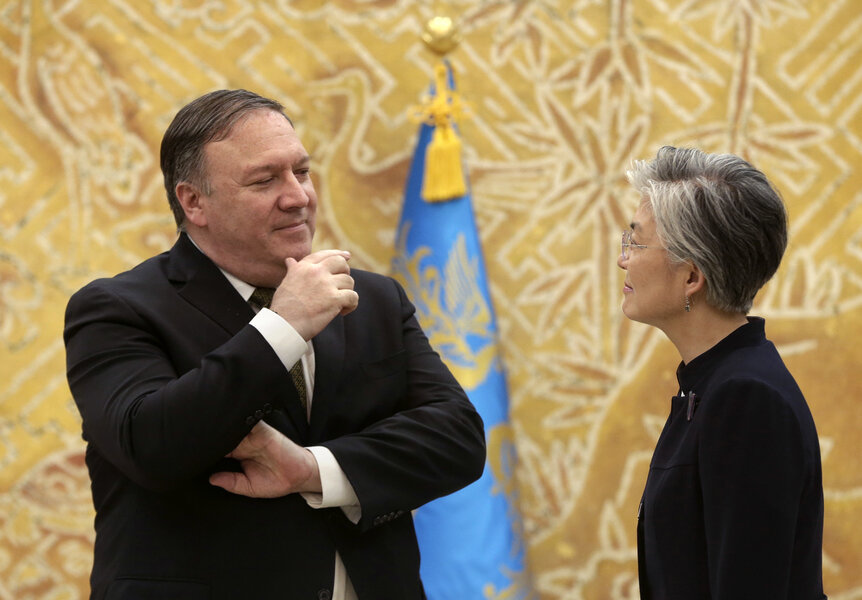Following US disapproval, S. Korea backs off from sanction lifts
Loading...
| Seoul, South Korea
South Korea on Oct. 11 walked back on a proposal to lift some of its unilateral sanctions against North Korea following President Trump's blunt retort that Seoul could "do nothing" without Washington's approval.
Foreign Minister Kang Kyung-wha had said on Oct. 10 that Seoul was considering lifting measures applied after a deadly attack in 2010 that killed 46 South Korean sailors. She cited the intent to create more diplomatic momentum for talks over North Korea's nuclear program.
South Korean conservatives reacted with anger as well, and Ms. Kang's ministry downplayed her comments later, saying in a statement that the government has yet to start a "full-fledged" review of sanctions, meaning no decision was imminent.
Unification Minister Cho Myoung-gyon told a parliamentary audit on Oct. 11 there has been no serious consideration given to lifting the sanctions and that doing so would be hard unless North Korea acknowledges responsibility for the 2010 attack. North Korea has fiercely denied it sank the Cheonan warship.
Liberal South Korean President Moon Jae-in hopes that progress in nuclear diplomacy will allow him to advance his ambitious plans for engagement with North Korea, including joint economic projects and reconnecting inter-Korean roads and railways. These projects have been held back by the sanctions against North Korea.
While arguing that improved inter-Korean relations could possibly facilitate progress in larger nuclear negotiations between the United States and North Korea, Mr. Cho said Seoul isn't ready yet to campaign for reduced pressure against its rival.
"At the current stage, I think it's a little early for us to call for the lifting or easing of the UN sanctions," Cho said.
Mr. Trump's response when he was asked about Kang's comments implied friction between the allies over the pace of inter-Korean engagement amid concerns in Washington that North Korea is lagging behind in its supposed promise to denuclearize.
"They won't do that without our approval," Mr. Trump said of the comments. "They do nothing without our approval."
Trump has encouraged US allies to maintain sanctions on North Korea until it denuclearizes as part of what his administration has termed a campaign of "maximum pressure" against leader Kim Jong-un's government.
Mr. Moon has mostly stayed firm on sanctions despite actively engaging with North Korea and floating the possibility of huge investments and joint economic projects in return for the North's relinquishment of its nuclear weapons.
A move by South Korea to lift some of its sanctions would have little immediate effect since US-led international sanctions remain in place. But it's clear Seoul is preparing to restart joint economic projects if the nuclear negotiations between the US and North Korea begin yielding results.
In the 2010 sanctions, South Korea effectively shut down all cross-border economic cooperation except for a jointly run factory park in the North Korean border town of Kaesong and banned North Korea from using shipping lanes in South Korean territory. The Kaesong factory park was shuttered in 2016 in response to a North Korean nuclear test and long-range rocket launch.
During Moon's visit to North Korea last month, he and Mr. Kim agreed to normalize operations at the Kaesong factory park and resume joint tours to North Korea when possible, voicing optimism that international sanctions could end and allow such projects.
The North and South also announced measures to reduce conventional military threats, such as creating buffer zones along their land and sea boundaries and a no-fly zone above the border. The North also said it would dismantle its main nuclear facility in Nyongbyon if the United States takes unspecified corresponding measures.
Washington, however, has insisted that efforts to improve relations between the Koreas should move in tandem with efforts to denuclearize the North.
Kang said Oct. 10 that US Secretary of State Mike Pompeo had expressed displeasure about the Koreas' military agreement. Kang was not specific but her comments are likely to fuel speculation Washington wasn't fully on board before Seoul signed the agreement.
Despite three summits with Moon and one with Trump this year, Kim has yet to provide a convincing sign that he's ready to deal away his nuclear weapons.
Despite the current mood of detente and negotiation between the Koreas, the removal of sanctions would be a difficult decision for Seoul's government.
South Koreans are deeply divided along ideological lines and many people still harbor deep anger over North Korea's 1950 attack that started the Korean War. There has been occasional bloodshed ever since – the 2010 attack on the warship was followed months later by North Korean shelling of a South Korean border island that killed four and gutted homes.
Kang pointed out that many parts of South Korea's 2010 sanctions now duplicate United Nations sanctions that were considerably strengthened after 2016 when the North began accelerating its nuclear and missile tests. She also described Seoul's unilateral sanctions as a key obstacle to restarting South Korean tourism to the North's Diamond Mountain resort, which was suspended in 2008 following the shooting death of a South Korean woman there.
But the removal of such sanctions wouldn't be enough to get the tours back on, said Koh Yu-hwan, a North Korea expert at Seoul's Dongguk University and a policy adviser to Moon. While UN sanctions against North Korea don't ban tourism, they do place restrictions on bulk cash transfers, he said. Still, the lifting of the 2010 sanctions could offer at least some tangible benefits to the North.
"For North Korea, the most meaningful result from the lifting of the May 24 measures would be that its ships will be able to travel through Jeju Strait again," said Mr. Koh, referring to waters between South Korea's mainland and the southern island of Jeju. "This will allow them to save time and fuel."
This story was reported by the Associated Press.







